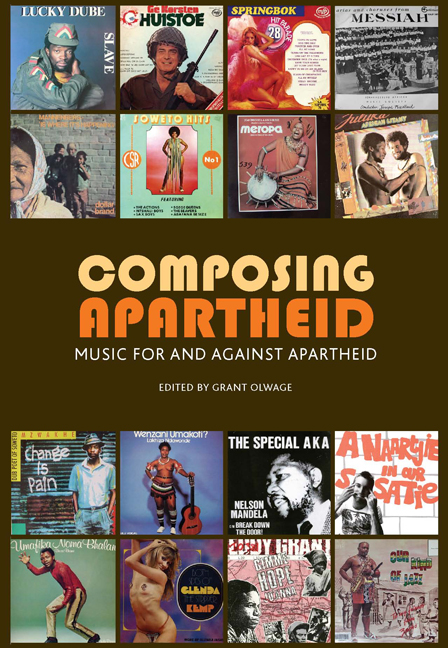Book contents
- Frontmatter
- Dedication
- Contents
- Acknowledgements
- Introduction
- Chapter 1 Back to the Future? Idioms of ‘displaced time’ in South African composition
- Chapter 2 Apartheid's Musical Signs: Reflections on black choralism, modernity and race-ethnicity in the segregation era
- Chapter 3 Discomposing Apartheid's Story: Who owns Handel?
- Chapter 4 Kwela's White Audiences: The politics of pleasure and identification in the early apartheid period
- Chapter 5 Popular Music and Negotiating Whiteness in Apartheid South Africa
- Chapter 6 Packaging Desires: Album covers and the presentation of apartheid
- Chapter 7 Musical Echoes: Composing a past in/for South African jazz
- Chapter 8 Singing Against Apartheid: ANC cultural groups and the international anti-apartheid struggle
- Chapter 9 ‘Nkosi Sikelel' iAfrika’: Stories of an African anthem
- Chapter 10 Whose ‘White Man Sleeps’ Aesthetics? and politics in the early work of Kevin Volans
- Chapter 11 State of Contention: Recomposing apartheid at Pretoria's State Theatre, 1990–1994. A personal recollection
- Chapter 12 Decomposing Apartheid: Things come together
- Chapter 13 Arnold van Wyk's Hands
- Contributors
- Index
Chapter 4 - Kwela's White Audiences: The politics of pleasure and identification in the early apartheid period
Published online by Cambridge University Press: 20 April 2018
- Frontmatter
- Dedication
- Contents
- Acknowledgements
- Introduction
- Chapter 1 Back to the Future? Idioms of ‘displaced time’ in South African composition
- Chapter 2 Apartheid's Musical Signs: Reflections on black choralism, modernity and race-ethnicity in the segregation era
- Chapter 3 Discomposing Apartheid's Story: Who owns Handel?
- Chapter 4 Kwela's White Audiences: The politics of pleasure and identification in the early apartheid period
- Chapter 5 Popular Music and Negotiating Whiteness in Apartheid South Africa
- Chapter 6 Packaging Desires: Album covers and the presentation of apartheid
- Chapter 7 Musical Echoes: Composing a past in/for South African jazz
- Chapter 8 Singing Against Apartheid: ANC cultural groups and the international anti-apartheid struggle
- Chapter 9 ‘Nkosi Sikelel' iAfrika’: Stories of an African anthem
- Chapter 10 Whose ‘White Man Sleeps’ Aesthetics? and politics in the early work of Kevin Volans
- Chapter 11 State of Contention: Recomposing apartheid at Pretoria's State Theatre, 1990–1994. A personal recollection
- Chapter 12 Decomposing Apartheid: Things come together
- Chapter 13 Arnold van Wyk's Hands
- Contributors
- Index
Summary
In 1957 something curious and unprecedented happened. A South African recording company released a long playing record, Something New from Africa (Decca LK 4292), featuring visiting American clarinetist Tony Scott in collaboration with a local penny whistle band called the Solven Whistlers, led by Ben Nkosi. What was unprecedented was the release of black South African music on LP, a format aimed exclusively at white audiences. What was curious was the new expectation that white South Africans would buy music by black musicians just at the very moment that the separation of different racial groups was beginning to be effectively enforced under various apartheid laws. The record company had not made a miscalculation: within a year other penny whistle LPs were being released in South Africa, and one track almost managed to top the British Hit Parade.
This penny whistle style, the first within the marabi-tradition of urban, hybrid, black South African popular music to effectively cross over into the white market, became known as kwela. A fusion of American big band swing with local compositional elements, kwela evolved on township streets, in shebeens and at stokvels.4 Initially it was played on penny whistles and guitars by boys, adolescents and young adults; later a string bass and drum-set were added. By the late 1950s the penny whistles were replaced by saxophones, the acoustic guitars and bass by electrified instruments, and kwela evolved into sax jive.
White South Africans had been introduced to music and dance variety shows performed by black artists during the Second World War when Ike Brooks organised the Zonk show to entertain troops. This variety show tradition was continued by Alf Herbert's African Jazz and Variety, and various productions organised by the Union of Southern African Artists that played to white audiences throughout the 1950s. It was, however, kwela musicians who consistently brought township music into white areas by busking in city streets and playing in public parks. By the mid-1950s the myriad of small groups of penny whistling buskers had made kwela a familiar part of white Johannesburg's soundscape, and penny whistle kwela came to be identified by white South Africans as a manifestation of their own cultural identity.
- Type
- Chapter
- Information
- Composing ApartheidMusic for and against apartheid, pp. 79 - 98Publisher: Wits University PressPrint publication year: 2008



